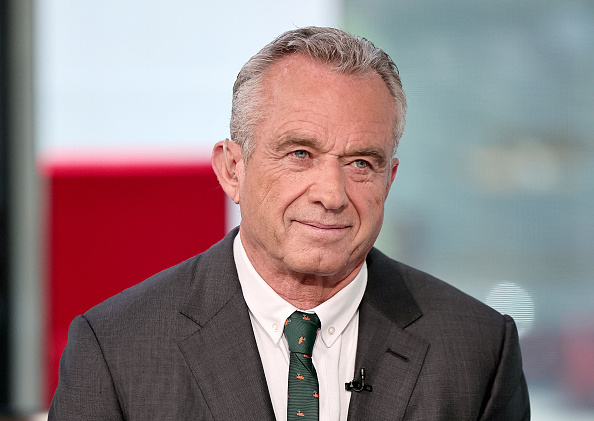In his welcoming remarks at the Department of Health and Human Services (HHS), Robert F. Kennedy Jr. told the agency’s employees it is time for a new era of “radical transparency” in dealing with the public.
Newly confirmed by a 52-48 Senate vote, Kennedy embraced the spirit of Elon Musk’s Department of Government Efficiency (DOGE) by telling his audience via video link on February 18 those unwilling to adopt transparency and openness “can retire.”
HHS, a $1.6 trillion agency, includes the National Institutes of Health (NIH), the Centers for Disease Control and Prevention (CDC), and the Food and Drug Administration (FDA). Kennedy’s tenure at HHS arrives as the nation grapples with public health agencies’ response to COVID-19.
Clearing the Air
Given his well-known views on hot topics such as vaccines, Kennedy made an effort to establish common ground among those entrusted with protecting public health.
“I’m not going to come in here and impose my belief on any of yours,” said Kennedy. “My goal as secretary here at HHS will be to create a culture of competency, of ethics, of openness, of transparency, of caring, and of pride so that individuals who share these ideals can flourish and thrive,” said Kennedy, according to an HHS transcript of his remarks.
Kennedy left little doubt changes are on the way.
“We will remove conflicts of interest on committees and research partners wherever possible, or balance them with other stakeholders,” said Kennedy. “We will make our data and policy process so transparent that people won’t even have to file a FOIA [Freedom of Information Act] request.”
HHS New Targets
Kennedy spoke of specific areas of concern not mentioned in President Donald Trump’s executive order titled “Make American Healthy Again” (see article on opposite page).
“Some of the possible factors we will investigate were formerly taboo or insufficiently scrutinized,” said Kennedy. “The childhood vaccine schedule, electromagnetic radiation, glyphosate, other pesticides, ultra-processed foods, artificial food additives, SSRI and other psychiatric drugs, PFAs, PFOAs, microplastics.”
Kennedy suggested those substances are behind some disturbing public health trends.
“It is not difficult to understand why in the U.S. six out of every 10 adults have at least one chronic disease and four in 10 have two or more,” said Kennedy. “The U.S. has the highest age-standardized cancer incident rate among 204 countries in the world, nearly double the next highest rate. Asthma and autoimmune diseases are far more common in the U.S. than in any other part of the world.”
Foxes in Henhouse?
In pledging to remove “conflicts of interest” on HHS advisory committees, Kennedy addressed the longstanding practice of experts serving on government advisory panels on drug and vaccine safety while receiving consulting fees and research funding from pharmaceutical companies.
Bloomberg Law raised the notion that Kennedy, as an agency head, may make panel selections more in line with his own views, including those on vaccines.
Sen. Bill Cassidy, M.D., (R-LA) chairman of the Senate Health, Education, Labor, and Pensions Committee, said Kennedy assured him prior to his confirmation he would not do that at CDC’s Advisory Committee on Immunization Practices (ACIP).
‘Perhaps Trillions at Stake’
Big Pharma and other huge corporations stand to gain much from their relationships with regulators, says Jane Orient, M.D., executive director of the Association of American Physicians and Surgeons.
“There are unquestionably conflicts of interest in the agencies concerned with drug and vaccine safety, and billions of dollars at risk if ACIP were to recommend against a vaccine— perhaps trillions at stake, if failure to add a vaccine to the childhood immunization schedule meant the company would lose its protection against product liability,” said Orient.
There is another area that needs attention, says Orient. “Besides removing conflicts, the government needs to make research data available for public scrutiny,” said Orient. “The need for informed consent should be sacred for all products, including vaccines, and consent cannot be fully informed without access to data.”
“In considering potential causes for U.S. rates of cancer and autoimmune disease, vaccines should be at the top of the list, not an afterthought, based on biological plausibility,” said Orient. “Microplastics are everywhere, and air pollution in the U.S. is currently much improved and likely better than in many other nations,” making them unlikely to be responsible for higher cancer rates.
Avoiding Cudgels
Removing conflicts of interest should not be used as a political tool, says Jeff Stier, a senior fellow at the Center for Consumer Choice.
“Of all of Secretary Kennedy’s initiatives, addressing conflicts of interest would appear to be the least controversial,” said Stier. “However, he should exercise caution to address actual current conflicts, and not use it as a cudgel to remove legitimate scientists with prior conflicts who don’t support his agenda.
“It’s important to recognize that conflicts can arise from a wide range of sources, not simply prior employment history,” said Stier. “An expert who served as a witness for plaintiffs in glyphosate litigation or who sat on the board of an environmental group is equally as conflicted as an expert who served as a witness for the defense, or who consulted for industry,” said Stier.
“Kennedy is correct to propose balancing committees with other stakeholders,” said Stier. “A diversity of well-argued approaches, even when those scientists previously provided their expertise for an interested party, is the best way to achieve the radical transparency Secretary Kennedy has promised.”
Bonner Russell Cohen, Ph.D., ([email protected]) is a senior fellow at the National Center for Public Policy Research.



